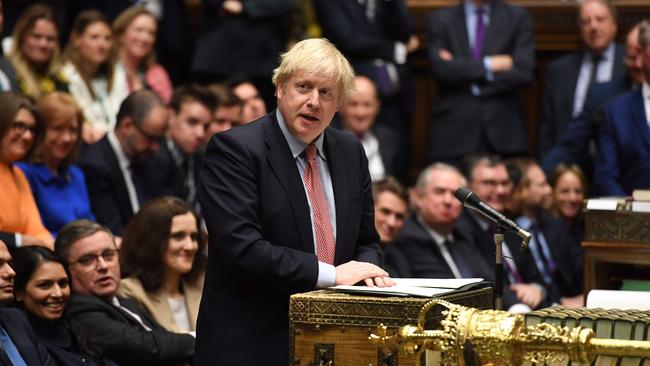UK election: Global anti-patriots just don’t get it, but Boris Johnson knows what’s what


The most telling moment of all, I thought, came when a northern voter was responding to a TV interviewer. The voter was a middle-aged man, respectable blue-collar I would guess. Asked about Jeremy Corbyn, he replied in a rich northern accent: “He din’t sing God Sae the Queen. I doan like that. That’s bad.”
Nationalism, or patriotism, has been the most powerful political force in the world for more than two centuries. It comprehensively trumped Marxism all through the 20th century. The neo-Marxist, postmodern ideologies that so disfigure academe, and in some bowdlerised fashion most of the woke folk of the chattering classes, routinely demonise nationalism.
The EU is dedicated to abolishing nationalism. It was Immanuel Kant who first introduced into Western philosophy the idea that internationalism and global governance was the road to perpetual peace.
Nationalism can be bad, but it is an almost natural force that can also be overwhelmingly good.
Edmund Burke famously declared: “To be attached to the subdivision, to love the little platoon we belong to in society, is the first principle (the germ as it were) of public affections.
“It is the first link by which we proceed towards a love to our country, and to mankind.”
In other words, decent nationalism is a principle of human solidarity. It draws people out of themselves and into commitment to their fellows. In societies such as Australia, Britain and the US, it has nothing to do with ethnicity.
International co-operation is best carried out by secure nations. The natural, traditional calls on human loyalty are family, faith and nation.
The striking element today is not how they’ve been eroded by aggressively secular and intolerant postmodern culture but how strongly they’ve persisted.
The Brexit vote and Johnson election were magnificent assertions of national sovereignty and democratic accountability. The US, Australia and Britain look to each other for political cues. The various national circumstances are distinctive but the commonalities are telling.
Australia had its Brexit election in 2001. The Howard government determined — in defiance of UN agencies, of liberal European and North American opinion, and to the disgust and derision of most Australian media — to assert control over our borders.
Like Johnson, the Howard government was a proponent of a basically liberal immigration program but insistent on the national government’s sovereign right to decide who came into the country and in what numbers.
The commentariat lost, though it never accepted its defeat, and the Howard government was re-elected with an increased majority. The Labor Party basically accepted the new politics of border control, though there is always doubt over its commitment, given the recrudescence of people-smuggling under the Rudd and Gillard governments.
Nonetheless, this acceptance allowed Labor to be competitive.
Not so British Labour. Correlation does not prove causation, but in 2017 the British Labour Party accepted the Brexit referendum result and promised, if elected, to implement the referendum result and leave the EU.
As a consequence, Brexit did not figure heavily in the 2017 election and British Labour did very well. At this election, under the wholly baleful influence of Tony Blair, it went back to recontesting the legitimacy of the referendum result and got clobbered. There were other factors too but these correlations are instructive.
Similarly, in Australia, of the past nine federal elections Labor has won a parliamentary majority in only one, 2007.
In that election it was led by a public, churchgoing Christian, described itself as fiscally conservative and promised to turn back the boats if necessary to maintain control of the borders.
Let me hasten to say I don’t think a leader’s religion should play any direct role in a campaign but it is the aggressive, intolerant insistence on the evils of religion that partly defines the contemporary left. A Liberal Democrat who is a Catholic had to resign in this British campaign and the party’s leader from 2017 had to stand aside because his Christian identity was incompatible with the Lib Dems’ identity.
If a left-of-centre party campaigns against family, faith or nation, it takes a very big risk, though of course there are many other factors, including basic competence.
For Anthony Albanese to re-embrace the Australian coal industry shows he is much more formidable than Corbyn.
Similarly, Barack Obama initially rejected traditional patriotism — epitomised by wearing a lapel pin of the US flag — but sensibly changed his mind when a military veteran asked him to. Corbyn refusing to sing the British anthem — seeing it no doubt as a symbol of imperialism — was a defining moment.
Three features of the election outcome intrigue me for the future. Britain, like Australia, has now had two or three generations of solid, postmodern, left-of-centre indoctrination in the classroom and even more in the universities. The BBC is even more dedicatedly woke than our own beloved ABC. Yet millions of ordinary people seem to have remained impervious to all this. How do they do it? Is there in everyone just a sinew of common sense that can instinctively discount high-falutin’ codswallop?
Second, quite a lot of young graduates did buy into the whole Corbyn ideology. Will they grow out of it? Are they a cohort forever lost to common sense, or is it an age effect?
Donald Horne in the Lucky Country in the 1960s predicted Australia inevitably becoming a republic because the young supported this move and the old would soon enough die off. But as the young grew up they grew more conservative and the republic is as far away as ever.
Third, what a paradoxical and fascinating political personality Johnson is. Perennially underestimated, Johnson’s persona is a considered performance.
And yet there is an authenticity, a kind of absolute security in his own skin, a sort of integrity of personality, that allows him to relate to people and they to him. Steve Bannon remarked the other day he wants no more lawyers running for congress for the US Republicans, he wants bartenders.
Johnson is no bartender but he is proof that you cannot really predict what it is that makes one personality work brilliantly in politics, while more conventional politicians such as Theresa May or Johnson’s Conservative Party leadership rival Jeremy Hunt leave people cold.
Who really predicted that ScoMo would be such an effective campaigner? Politics is much nearer art than science.



Like all great political leaders, Boris Johnson both reflects and creates reality. This spectacular British election can easily be over-interpreted, but nonetheless there are real lessons there aplenty.